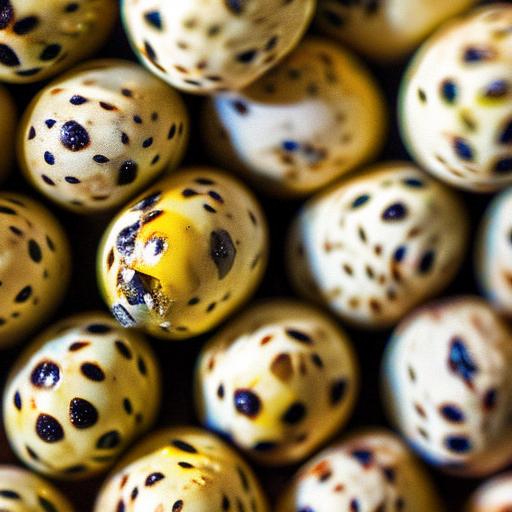Quail eggs are small, speckled eggs that come from the quail bird, a small game bird that is often raised for its meat and eggs. These eggs are gaining popularity in the culinary world due to their delicate flavor and high nutritional value. Quail eggs are rich in protein, vitamins, and minerals, making them a healthy addition to any diet. They are also known for their beautiful, speckled shells, which make them a popular choice for decorative purposes. Quail eggs are not only delicious but also versatile, as they can be used in a variety of dishes, from salads and appetizers to main courses and desserts.
Quail eggs are also commonly used for hatching, as quail birds are prolific layers and can produce a large number of eggs in a short amount of time. These eggs are often incubated to hatch quail chicks, which can then be raised for their meat or to produce more eggs. However, the viability of quail eggs can be affected by a number of factors, including storage conditions, age of the eggs, and handling practices. In this article, we will explore the various factors that can impact the viability of quail eggs and provide recommendations for proper storage and handling to ensure successful hatching.
Key Takeaways
- Quail eggs are smaller than chicken eggs and have a higher yolk to white ratio.
- Factors affecting the viability of quail eggs include age of the eggs, temperature, and humidity during storage.
- Proper storage of quail eggs involves keeping them at a consistent temperature and humidity level.
- Signs of egg viability include a clear and well-defined air cell, a strong and intact shell, and a visible embryo when candled.
- It is recommended to incubate quail eggs within 7-10 days of being laid for the best hatching success.
- Extended storage of quail eggs can significantly reduce hatching success due to the aging of the eggs.
- In conclusion, it is important to properly store and incubate quail eggs within a recommended timeframe to maximize hatching success.
Factors Affecting the Viability of Quail Eggs
Several factors can affect the viability of quail eggs, including the age of the eggs, temperature fluctuations, humidity levels, and handling practices. The age of the eggs is one of the most critical factors, as older eggs are less likely to hatch successfully. As quail eggs age, the air cell inside the egg expands, which can make it more difficult for the embryo to develop properly. Additionally, temperature and humidity fluctuations can also impact the viability of quail eggs. Fluctuations in temperature and humidity levels can cause the embryos to develop abnormally or even die, leading to a lower hatch rate.
Proper handling practices are also essential for maintaining the viability of quail eggs. Rough handling or improper storage can cause damage to the eggs, which can reduce their chances of hatching successfully. It is important to handle quail eggs with care and store them in a cool, dry place to ensure their viability. By understanding and addressing these factors, quail breeders can improve the chances of hatching healthy quail chicks from their eggs.
Proper Storage of Quail Eggs
Proper storage is crucial for maintaining the viability of quail eggs. Quail eggs should be stored in a cool, dry place with consistent temperature and humidity levels. Ideally, quail eggs should be stored at a temperature of around 55 degrees Fahrenheit and a humidity level of 60-70%. It is important to avoid temperature fluctuations, as well as exposure to direct sunlight or extreme temperatures, as these can negatively impact the viability of the eggs.
Quail eggs should also be stored with the pointed end facing downward, as this helps to keep the air cell in the correct position and prevents it from expanding too much. Additionally, it is important to handle quail eggs with care when storing them, as rough handling can cause damage to the delicate shells. By following these storage guidelines, quail breeders can help ensure that their eggs remain viable and have a higher chance of hatching successfully.
Signs of Egg Viability
There are several signs that can indicate the viability of quail eggs. One of the most common signs is the presence of a well-defined air cell at the blunt end of the egg. A well-defined air cell indicates that the egg is fertile and has been developing properly. Additionally, viable quail eggs will often have a slightly translucent appearance when candled, allowing you to see the developing embryo inside.
Another sign of egg viability is the presence of movement when the egg is candled. Candling is a process where a bright light is shone through the egg to allow you to see inside. If you see movement or detect a heartbeat when candling a quail egg, it is a strong indication that the egg is viable and developing properly. By learning to recognize these signs of egg viability, quail breeders can better assess the health and potential for hatching success of their eggs.
Recommended Timeframe for Incubating Quail Eggs
The recommended timeframe for incubating quail eggs is typically around 17-18 days. Quail eggs have a relatively short incubation period compared to other poultry species, which makes them an attractive option for breeders looking for a quick turnaround. It is important to maintain consistent temperature and humidity levels throughout the incubation period to ensure that the embryos develop properly.
During the incubation period, it is also important to turn the eggs regularly to prevent the embryos from sticking to the shell membrane. This can be done manually several times a day or by using an automatic egg turner in an incubator. By following these guidelines and closely monitoring the incubation process, breeders can increase their chances of hatching healthy quail chicks from their eggs.
Extended Storage and Its Impact on Hatching Success

Extended storage can have a significant impact on the hatching success of quail eggs. As quail eggs age, their viability decreases, making them less likely to hatch successfully. While it is possible to store quail eggs for a short period of time before incubating them, extended storage can lead to lower hatch rates and an increased likelihood of abnormal development.
It is generally recommended to incubate quail eggs within 7-10 days of being laid to maximize their chances of hatching successfully. If eggs need to be stored for longer periods before incubation, it is important to carefully monitor their condition and viability. By understanding the impact of extended storage on hatching success, breeders can make informed decisions about when to incubate their quail eggs to achieve the best results.
Conclusion and Recommendations
In conclusion, quail eggs are a valuable resource for both culinary and hatching purposes. However, their viability can be affected by various factors such as age, temperature fluctuations, humidity levels, and handling practices. Proper storage and handling are essential for maintaining the viability of quail eggs and increasing their chances of hatching successfully.
It is important for breeders to store quail eggs in a cool, dry place with consistent temperature and humidity levels. By following recommended storage guidelines and closely monitoring the condition of the eggs, breeders can improve their chances of hatching healthy quail chicks. Additionally, understanding the impact of extended storage on hatching success can help breeders make informed decisions about when to incubate their quail eggs for optimal results.
Overall, by taking proper care of their quail eggs and understanding the factors that affect their viability, breeders can increase their chances of successfully hatching healthy quail chicks and enjoying the many benefits that these small but mighty eggs have to offer.
If you’re interested in hatching quail eggs, you might also want to learn about the natural hatching process for chicken eggs. Understanding how long it takes for chicken eggs to hatch naturally can provide valuable insights into the incubation period for quail eggs. Check out this informative article on PoultryWizard to gain a deeper understanding of egg incubation and hatching.
FAQs
How long can you keep quail eggs before incubating?
Quail eggs can be kept for up to 7-10 days before incubating, as long as they are stored properly.
What is the proper way to store quail eggs before incubating?
Quail eggs should be stored in a cool, humid environment with a temperature of around 55-60 degrees Fahrenheit and a humidity level of 70-80%.
Can quail eggs be refrigerated before incubating?
Yes, quail eggs can be refrigerated before incubating, but it is important to let them come to room temperature before placing them in the incubator.
How can you tell if quail eggs are still viable for incubation?
To check the viability of quail eggs for incubation, you can perform a process called “candling” where you shine a light through the egg to see if there is any development inside.
What factors can affect the viability of quail eggs before incubating?
Factors such as age of the eggs, storage conditions, and handling can affect the viability of quail eggs before incubating. It is important to ensure that the eggs are fresh and properly stored.
Meet Walter, the feathered-friend fanatic of Florida! Nestled in the sunshine state, Walter struts through life with his feathered companions, clucking his way to happiness. With a coop that’s fancier than a five-star hotel, he’s the Don Juan of the chicken world. When he’s not teaching his hens to do the cha-cha, you’ll find him in a heated debate with his prized rooster, Sir Clucks-a-Lot. Walter’s poultry passion is no yolk; he’s the sunny-side-up guy you never knew you needed in your flock of friends!







